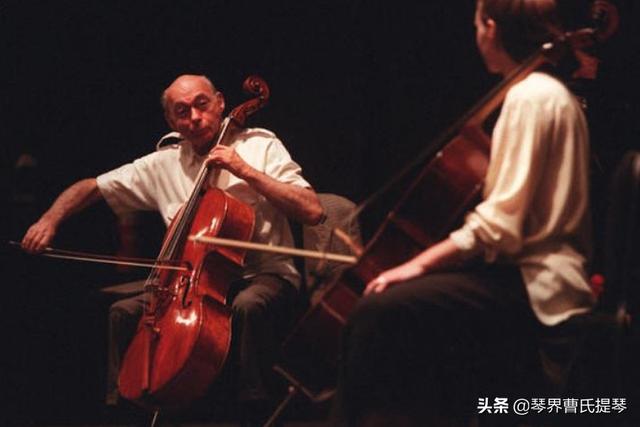回忆大提琴家亚诺什·斯塔克
ON CELLI JANOS STARKER
上篇
本文作者约翰·塞洛尔

美籍匈牙利大提琴家斯塔克(Janos Starker)有着高超的技巧,追求质朴、刚劲的演奏。他重新编订了巴赫的6首无伴奏组曲,强调了那种粗砺、刚劲的表达。他演奏的科达伊的奏鸣曲,把此曲技巧上的高难表现得游刃有余堪称绝活。而他录制的德沃夏克协奏曲,舒曼、拉罗、圣桑的协奏曲,都是他最成熟时期的丰硕成果。这篇文章是斯塔克的学生约翰·塞洛尔(John Cloer)的回忆录 ,记录了他如何跟从斯塔克学习的过程以及个中的珍贵体验,这篇自传性的文章不仅限于大提琴学习者,相信能够引起更多音乐学习者的共鸣。
斯塔克演绎《柯达伊大提琴奏鸣曲》第一乐章
The following article is an autobiographical description of study with the world- renowned cellist and pedagogue Janos Starker. Currently in his eighty-fourth year, Professor Starker still maintains a full a full studio at the world-renowned Indiana University's Jacobs School of Music, teaching both fall and spring semesters as well as through the summer sessions.
这篇文章带有自传性质,是关于我与世界著名的大提琴家、教育家亚诺什·斯塔克学习的叙述。现在斯塔克教授84岁,他仍然在世界著名的印第安纳大学雅各布斯音乐学院维持着一个十分完整的工作室的运转,秋季学期和春季学期以及暑期班也都去授课。
Even though he proclaimed a concert at the 2005 World Cello Congress as being his final public performance, he still continues to circumnavigate the globe teaching master classes in cello and chamber music, initiating and supporting foundations, honoring colleagues for their contributions, and standing as a bastion of strength and support for any and all who are driven to strive for knowledge, improvement and perfection. His litany of former students includes instrumentalists in many of the major orchestras and institutions of higher learning throughout the world.
尽管他声明,其在2005年世界大提琴大会上的那次音乐会是他最后一次公开演出,他还是游遍世界各地,去教授大提琴和室内乐的大师班、创办和支持基金会、为在事业发展中做出贡献的他那些同事们授予荣誉称号,作为最强有力的堡垒伫立在所有那些备受鼓舞而对知识、自我的提高和完善如饥似渴之人的身旁。

He is also acknowledged and respected by generations of colleagues as being one of the few artists of all time equally gifted and successful at both performing and teaching. One would, in fact, be hard-pressed to find a classically trained musician anywhere for which his name would not elicit a strong response.
他之前的众多学生包括许多世界著名的管弦乐团和高等教育机构里的演奏者,他也被一代又一代的同事们尊称为为数不多的、在演奏和教学方面同样有天赋且十分成功的艺术家之一。实际上,人们应该很难找到一个对斯塔克评价不高的古典音乐家了。
Much of Starker's teaching career has been centered in Bloomington, Indiana. Indeed, the school's musical infrastructure is due in large part to his, and a few of his closest colleagues, influence. Along with such artists as Josef Gingold and György Sebok, Starker worked tirelessly to build an environment where young musicians, whether their interests be solo, collaborative or orchestral, could amass the most complete body of information and experiences for every possible aspect of music making.
斯塔克的大部分教学生涯都集中在印第安纳州的布鲁明顿。的确,学校里的音乐设施有很大一部分都源自他和他一些关系亲密的同事们的影响。与像约瑟夫·金戈德和乔治·塞伯克这样艺术家们一起,斯塔克教授不知疲倦地工作着,为年轻的音乐家们打造这样一个环境——无论他们的兴趣点是在于独奏、协奏、管弦乐团合奏,抑或在音乐制作等任何一个方面上,都可以在此次学习过程中积累到尽可能多的知识和经验。

Students who recognized and took advantage of the unique possibilities found three distinctly different artists and personalities, coming from three completely different directions, who were united in their determination that the celebration of these collective differences would produce students that…"not only could do but would know" (Starker, personal communication, 2006).
意识到并抓住这此难得的机会的学生们,将能够体会到这三位来自不同专业方向的、个性迥然不同的艺术家的不同之处,在斯塔克看来正是这种差异性将使学生“知其然并知其所以然”(斯塔克的个人谈话,2006)。在斯塔克教授八十岁出头时,我也成为了那些学生中的一员,体验到了这种绝妙的学习机会。
In the early 80's I became one of these students and for me the recognition of this extraordinary opportunity was almost immediate and completely total. Along with hundreds of like-minded string players and pianists, my week consisted of long hours in the practice room interspersed with the Monday night chamber class of Sebok, the Tuesday night violin class of Gingold, the Saturday afternoon cello class of Starker, my individual lessons, and numerous chamber ensemble rehearsals. This intensity and immersion led to a body of information.
与数以百计的志趣相投的弦乐演奏者和钢琴家一起,我的一周大部分时间都在练习室度过,中间还点缀着周一晚上塞伯克的室内乐课、周二晚上金戈德的小提琴课、周六下午斯塔克的大提琴课、我的个人课程以及大量的室内乐合练。这样的强度和沉浸使我获得了大量的信息资源、经验和知识。

The inspiration and motivation for this article was in fact born during my graduate study at Indiana. I had chosen Indiana after taking auditions at what was a litany of the best schools on the East Coast and with some of the most prominent artist/teachers known. At each school I had asked the artist/teacher for a lesson after the audition and, with one exception, all were eager to comply.
写这篇文章的灵感和动机应该说是在我在印第安纳大学的进行研究生学习时诞生的。当我在东海岸时曾在许多名校向著名艺术家或教师们试奏过,最终我选择了印第安纳大学。在每所学校,我都会在试奏后请求那位艺术家/老师为我上一节课,除了一次例外,其余时候他们都会欣然应允。
The consensus after my auditions seemed to be what those of us in the profession have come to know as the standard selling pitch of every artist eager to attract a full and diverse studio. I was collectively told that I was talented, accomplished, and well on my way to a successful performing career.
我的试演引起的老师们一致的反馈,正如在我们做这行的人都知晓的那样,每一位艺术家总期望能收获一个全面而多样化的演奏工作室,我每次都被告知说,我很有天赋且技巧娴熟,正处于通向成功的表演生涯的大路上。

My study with them at their respective schools would inevitably be the impetus toward achieving my goals. At all of the schools, I received substantial scholarships and was somewhat gratified by the words of encouragement and acknowledgment that I had heard.
在其各自的学校里与他们一起的学习无疑会成为我实现目标的动力。在所有那些学校里,我都收到了大量的奖学金,并为我听到的那些鼓励和认可感到一丝满意。
My audition at Indiana was the last in my circuit and took place on a Saturday in March of 1980 in Janos Starker's studio at the School of Music, MA-155. In a prior telephone conversation when I inquired about the possibility of receiving a lesson, Starker had informed me that there would be a cello class during the afternoon of my audition. According to him, I could observe his teaching there and, after the cello class, we "could talk." Four other faculty members were present during my audition.
在印第安纳大学的试奏是我在东海岸试奏的最后一站,那是在1980年一个三月的星期六,于音乐学院亚诺什·斯塔克教授的工作室里,房间是MA-155。在先前的一个电话交谈中,我问到上一节课的可能性,斯塔克就告诉我说,在下午的试奏过程中就会有一节大提琴课。按他的话说,我可以在那里观察他授课,下课后,我们 “可以交流”。在我试奏时,还有四个其他教职工也在现场。

I later came to know that they were Fritz Magg, Helga Winold, Gary Hoffman, and Walter Gödde, who was at that time Starker's assistant. I played portions of the first movement of the Dvorak Concerto, the second movement of the Haydn D Major Concerto, Bach's d minor Suite for Solo Cello and Boccherini's A Major Sonata.
后来我知道他们是Fritz Magg, Helga Winold,Gary Hoffman和Walter Gödde,当时是斯塔克工作室的助手。我拉了德沃夏克《大提琴协奏曲》第一乐章的一部分,海顿《D大调大提琴协奏曲》的第二乐章,巴赫《d小调大提琴无伴奏组曲》和波凯里尼的《A大调大提琴奏鸣曲》。
Starker asked briefly about my undergraduate study, the repertoire I had worked on, and asked me to play excerpts from this repertoire. After giving me directions to the room where the cello class would occur, he dismissed me by saying, "You are done."
斯塔克简洁地问了我本科学业情况以及我准备的保留曲目,并让我演奏这份保留曲目的节选。在给我指明要上大提琴课教室的方向后,他说:“你结束了”,就让我离开了。

The master class took place in MA-405, a room designed to seat a maximum of seventy-five persons and, by the time I arrived, there was standing room only. It remained so for the first two hours of the four-hour class yet I do not remember being tired of standing, even after the intensity of the audition. It was not until the third hour that I managed to find a seat.
大师班的课在房间MA-405上,那是一间有75个座位的教室,然后当我到时,只剩站着的地方了。就这样持续了两个小时——也就是课的一半时间,我一点都不觉得累,即使那是在紧张的试奏之后。
What followed was eight thirty-minute lessons whereby each student played either one movement of a concerto, one movement of a duo sonata, etudes, or movements of solo suites or sonatas. The final lesson was the first movement of Schubert's B flat piano trio. Although the language spoken throughout the class was primarily English, much of what was discussed was completely unfamiliar to me.
在第三个小时我终于找到了一个座位。接下来同样是四小时的课,每位学生都要从这里面选一样进行演奏:协奏曲的一个乐章、二重奏奏鸣曲的一个乐章、练习曲或是无伴奏组曲或奏鸣曲。

It was also obvious to me that everyone else seemed completely familiar and at ease with the information being given. What remains imprinted on my brain however, was the fact that I could clearly see and hear the distinct improvement of each and every student, even though my comprehension of exactly why they improved remained elusive.
最后一节课是舒伯特《降B大调钢琴三重奏》的第一乐章。虽然主要是英语授课,在课上讨论的许多东西我却完全不熟悉。并且我知道,显然这以及在课上给出的许多知识对其他人来说似乎都是小菜一碟。但也有深深印在我脑海里的东西,那就是我可以清楚地看见并听到属于每位学生自己的独特乐章,还有即使是对他们每人进步原因的理解,现在也能在我眼前清晰浮现。
Although I had performed in and attended master many classes throughout my student career, I had never witnessed anything even remotely comparable to the information that was disseminated. The overriding thought that I remember from the experience was the sobering realization that I could never possibly consider myself a professional musician without understanding the concepts being discussed. This fact somewhat overwhelmed me.
尽管我在学生时代已经参加了许多大师班,并且在里面演奏过,但我从未见证过如此特别的教授方法,哪怕与之类似的情况都没有出现过。这次经历令我记忆最深刻的,就是清楚认识到,如果我没有理解课上讨论的那些概念,我将永远不能成为一名职业音乐家。这个事实在某些程度上击垮了我。

After the class, I and at least a dozen others followed Starker back to his studio where he proceeded to schedule lessons for the next week. After everyone had left, Starker turned to me and, in words that due to his inimitably precise and calculated brevity are still imprinted on my brain, he said, "Look. You obviously feel the music and you have good hands but you are basically fighting the instrument. It is the type of playing I detest because it is so unnecessary.
课后,我和至少12个人跟随着斯塔克去了他的工作室,他安排下周课程的地方。当所有人离开后,斯塔克转向我,用独特的一丝不苟和简洁而足以深深烙印在我脑海中的话说道:“你看,你显然已经很好地感受了音乐,并且有很优秀的一双手,然而你实际上在与乐器对抗。这是我讨厌的类型,因为它是如此多余。”
You are accepted to study at Indiana but you would be better off if you went some place where they would make you feel good about yourself. Here you will have to start over with the basics……from scratch. I should tell you though, if you do not start over, you will never know what you don't know. You will also never be successful. Do you have any questions?"
“你被印第安纳大学录取了,但是如果你去一些能让你对自己感觉良好的地方,你会有更好的发展。在这里你必须从基础开始,从头做起。虽然我得告诉你,如果你不从头开始,你将永远不会知道你未知的那些东西,你也不会成功。你还有任何问题吗?”

Even though my head was awash with questions from the class, my embarrassment at my ignorance and the shock of his words effectively rendered me speechless and I simply shook my head negatively. He then said, "No? Then good-bye and good luck."
纵然我脑袋里充满着关于课上的各种问题,无知带来的羞惭和对于教授话语的震惊成功地使我哑口无言,我仅是消极地摇摇头。他说:“没有?那就再见吧,祝你好运。”
The next month was spent trying to reach a decision regarding my future study. More than twenty-five years later, these deliberations are still palpable. At that time, I had so needed and wanted to believe the positive attestations and affirmations that I had received from the other artist/teachers.
接下来的一个月我一直在考虑我未来学习的问题。25年多以后,我仍然记得那些反复深入的思考。那时,我如此需要和渴望去相信别的音乐家或老师们给予我的积极的肯定,与之相对的,则是在观察了大师课的基础上。

In contrast to this was Starker's terse assessment paralleling my own realization of my lack of knowledge, awareness, and experience upon observing the master class. With the discrepancy between Starker and all the others, I had to acknowledge the possibility that these other artist/teachers simply needed to strengthen their respective studios.
斯塔克简洁的评价让我意识到自己知识、意识以及经验的匮乏。在斯塔克与其他人的差异下,我不得不承认,其他人都很可能只是需要提高他们自己演奏工作室的质量罢了,因此他们对我说的话都是经过谨慎加工的。
Consequently, their words to me might be somewhat circumspect. On the other hand, from the number of students in the class and around him, Starker obviously neither needed nor wanted more students. He therefore had no apparent logical reason to so directly address me other than honest appraisal. Especially after watching the class, I felt instinctively that he was correct in his assessment. Consequently, after much thought, I decided to attend Indiana University and study with Starker.
反之,斯塔克教授的班级和周围都已经有太多学生了,他显然不需要也不想拥有更多学生,所以他没有明显且合理的理由不去对我做诚实的评价。尤其是在观摩了他的课后,直觉上我认为他的评价是对的。于是在深思熟虑后,我决定上印第安纳大学跟着斯塔克学习。
版权声明:本文摘自音乐文献编译组,仅供参考、交流、学习等非商业目的。转载的稿件版权归原作者和机构所有,如有侵权,请联系我们删除,谢谢合作!
,




